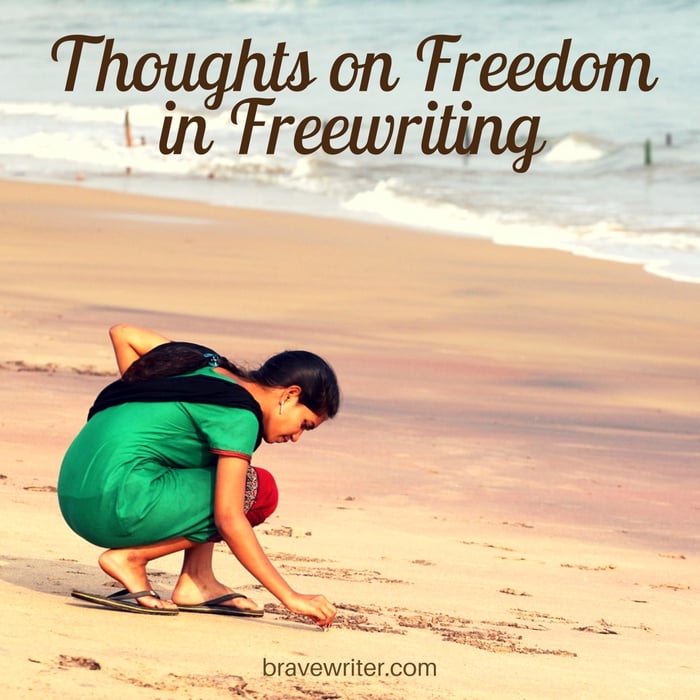Thinking, speaking and writing

Freewriting is not easy or natural for everyone. Freedom can sometimes feel overwhelming, or too spacious, or simply uninviting. Sometimes we prefer that someone else prepare a beautiful experience for us, not have to create it for ourselves (for instance, the enjoyment of reading over writing). Yet to create does require a kind of freedom from anxiety that supports the process. Freewriting aims to give kids the chance to explore their inner life (words, images, thoughts, fantasies, desires, insights, stored facts, values, beliefs, opinions) in written language. They do this in their heads already (that’s what thoughts are – utterly free to come and go, to wax and wane, to make sense or not, to justify, rationalize, solidify, comfort and empower). Kids are learning how to do it in spoken language every day. Some days are better than others: fluency and self-expression develop over time. The “you” of age five (fluent in English in terms of vocabulary, grammatical accuracy and intonation to convey meaning) is less nuanced and effective in conveying information or conforming to ettitquette or articulating a point of view than the you of 20, and the you of 20 is most certainly more fluent than 5 yet less fluent than you at 45!
We need to see communication on a continuum of effectiveness that develops over a lifetime.
So your success in thinking without restriction is magical in how free it is (due to the lack of scrutiny coming from outside voices). We do (at times) collect some outside voices to control our thought life (whether deliberately – a religious text or pyschological self-help profile; or accidentally – the voices of a nurturing parent or the words of a cruel teacher or the harsh reprimands of a coach). Still our thoughts have the most freedom to roam.
Spoken language comes second in the degree of freedom we feel. Yet we get daily opportunities to explore spoken language and we maximize those in conversations that are unscheduled, without pre-determined topics. We generally follow the words around based on outside stimulation (It’s thundering outside, we exclaim “Did you hear that?”; The television broadcasts a new episode of a favorite reality show, we say, “Do you think Jamie will get voted off?” launching us into a discussion about pros and cons). There are risks, there is growth, there is freedom. Occasionally we must conform to spoken conventions (please, thank you, after you, or even more rigidly, giving a speech, making a sales pitch).
What’s tricky about writing is that we are involving that many more parts of the brain. We have to include hand-eye coordination, we have to manage the sonic impact of the words on how we form them in letters, we translate pauses and emphasis into puctuation, we have to think about structure in ways that don’t occur to us orally… all while thinking about what we want to say. Writing takes longer to master. Too often, writing tactics skip all the necessary development in written self-expression and go straight to control – how to control what you want to say in a given shape – none of this playful freedom of thinking, none of this casual risking as in talking. Writing expects neatness, proper shape and clarity of thought all at once.
So to get past that tendency to “straight jacket” self-expression in writing, we have to mimic the same process that nurtured a “free” thinker (free to think what one wants to think), the same process that developed a “free” speaker (someone who can meaningfully interact with another speaker without anxiety for how to do/say it). We need to create “free” writers – people who can risk their original selves in writing without worry that scrutiny or judgment or formats will impede their thought processes. Freewriting enables kids to move beyond the worry that their words will be judged. If they resist freewriting, it’s often because they’ve either had too many bad experiences with writing (therefore having a hard time believing that they have the freedom they are being told they have), or they simply haven’t worked that muscle yet. In either case, the key is to shorten the time length (even just a minute of passionate, scrawling across the page until the ringer dings is enough to start with). Remind them that ALL words count (even “I hate writing” and “Why am I doing this?” and “I wish I could throw my math book out the window”).


















